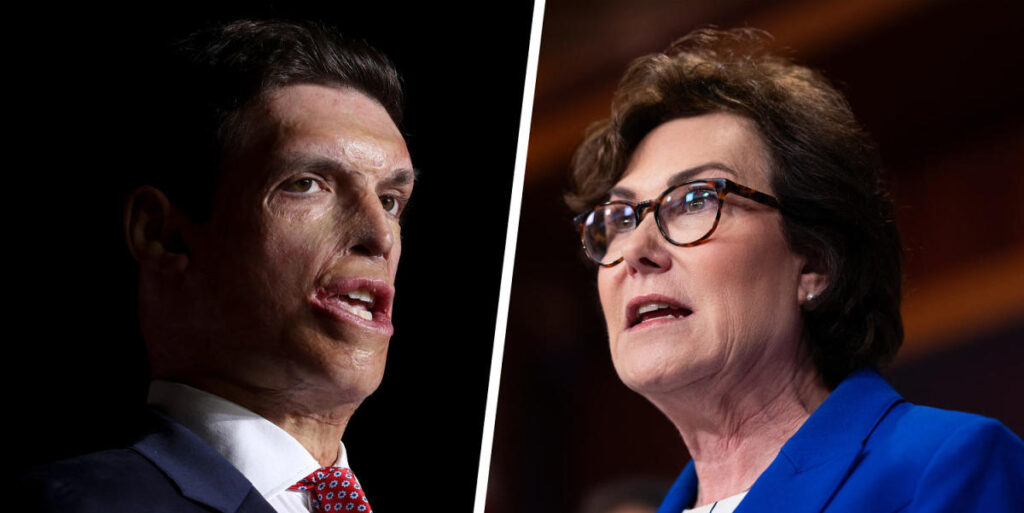In the politically charged atmosphere of Reno, Nevada, Senator Jacky Rosen rallied union workers at the Culinary Union hall, emphasizing the significance of their efforts in the weeks leading up to the election. Rosen’s message highlighted the critical nature of the Nevada race, framing it as central to maintaining the slim Democratic majority in the Senate. She underscored the importance of grassroots campaigning, as on-the-ground support would play a key role in determining not only her re-election but also the overall balance of power in the Senate. This particular election cycle features a tense showdown between Rosen and her Republican opponent, Sam Brown, an Army veteran, with both parties anticipating a closer contest as influential figures from each camp, including Donald Trump and Kamala Harris, campaign in-state.
The stakes are high for Democrats in Nevada, necessitating a win to solidify their Senate majority, which is further complicated by the ongoing battle over other competitive seats. While Republicans don’t need to capture Nevada outright to regain control, doing so could significantly bolster their presence and influence in the Senate, dramatically affecting policy direction. Rosen paints a clear picture for voters, framing her candidacy as a pragmatic alternative to what she describes as Brown’s extreme positions. In contrasting her collaborative style with Brown’s more radical approach, she aims to position herself as the candidate who delivers tangible results for the constituents of Nevada.
From the Republican perspective, fueled by concerns over economic issues such as rising gas prices and grocery bills, they believe they have an edge, particularly among working-class families. Brown’s campaign spokesperson insists that voters resonate with his plan to eliminate taxes on tips and Social Security benefits. Republicans see Nevada as a potential battleground due to its history of tightly contested elections, where Democrats won by narrow margins in recent cycles. Factors such as shifting voter demographics, particularly among Latino voters, and the rising number of independents, create waves of uncertainty about Rosen’s incumbency. Despite the shifting landscape, polling indicates that Brown has struggled to gain traction in statewide surveys, often lagging behind Trump among key demographics.
The Republican strategy appears strained by the relatively weak campaign presence of Brown himself. Observers within the GOP express frustration over missed opportunities, suggesting that his campaign has failed to respond effectively to the Democratic narrative and that there has been insufficient campaigning across the state to build notable recognition. With a significant ad spending advantage held by Democrats, Brown’s campaign has needed to not only increase visibility but also break through the increasingly negative messaging from the Rosen camp, which has centered on hot-button issues like abortion and economic concerns, reshaping the electoral landscape.
As the election draws closer, Rosen is balancing the pressures of aligning with the national Democratic figures while affirming her independence. She strategically emphasizes bipartisanship and results-driven governance, which contrasts with her campaign’s criticism of Brown as a representative of extremist politics. Her advertisements and public appearances focus on important issues, including reproductive rights, which resonate strongly with voters in a state that largely supports abortion access. Rosen’s outreach efforts are also tailored to engage younger and Latino voters, critical demographics for any Democratic strategy in Nevada.
The political theater in Nevada this election cycle represents a microcosm of national-level discussions, particularly as both parties recognize the importance of this battleground state. Rosen’s early and substantial ad spend reflects her aggressive strategy to define the race and confront Brown’s narrative. Despite Brown’s assertions of being rooted in the community and hard-working, the challenges remain significant as he tries to catch up not just to Rosen, but also to the momentum Trump brings into the state. As the campaigns intensify, the dynamics may shift leading to a more unpredictable outcome which will be indicative of broader national trends heading into the upcoming elections.
In conclusion, the Nevada Senate race embodies the tightly contested nature of American politics today, with the outcome having potential ramifications far beyond state lines. Both parties have mobilized resources, rhetoric, and high-profile endorsements to sway the electorate. The complexities of local voter sentiments and national implications create a charged political environment that will capture the attention of analysts and citizens alike in the weeks leading up to the election. As both candidates try to carve out their identities and appeal to diverse voting blocs, the growing importance of issues like economic stability, public health, and social rights will continue to shape their strategic narratives and the ultimate decision-making of the electorate.

